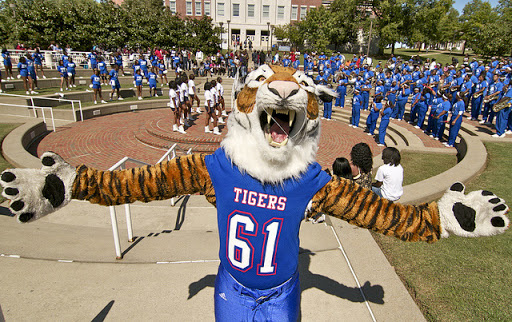Kai Cole, a record-breaking sprinter at Norfolk State University, was disqualified from competing in the USA Track & Field Olympic Trials this past weekend due to his scores being deemed “unsanctioned” by USATF. The shocking news has left Cole devastated and the HBCU community in an uproar with fellow Spartans demanding #justice4kaicole across social media.
Being a very decorated athlete, and a six-time MEAC champion, Cole earned a score of 10.05 in the 100-meter dash at the MEAC outdoor track and field championship. This score guaranteed his position in the USATF Olympic Trials. His score was so impressive, it has also been deemed that it was the third fastest in the NCAA this season. With so much excitement, it all came to a halt on June 20th, when Cole released a statement on Instagram announcing his denial “due to the MEAC’s failure to sanction [the] conference track meet.” Cole’s scores were rejected and ultimately denied after submitting an appeal.
Cole’s scores were denied due to his record-breaking race being “unsanctioned.” In 2023 a new requirement was added to the USATF qualifying list. “All entry performances must be legal marks that have been achieved at a USATF-sanctioned meet or at a meet listed on the (World Athletics Calendar) and be included in the World Athletics Toplists”.
While Cole, just an athlete, mentioned that many of his prior races and events had been sanctioned adding, “A lot of track meets we go to are sanctioned but The one that MATTERED wasn’t.”
The US Olympics are every four years and many student-athletes who are dedicated like Cole, dream of this moment. To have it taken away due to the negligence of a higher power raises the question of “Do athletes truly matter?” and places the mental strain of “Is this all in vain?” With Cole being a graduate student in his final season, this was his one shot to a bigger stage that would amplify HBCUs on a national level and even reach worldwide. Cole stresses the point deeper adding, “This is a bad look on HBCUs anyway, I just hate that I had to be the one, the guinea pig.”
Adding to that Cole emphasized, “I still feel like they owe me an apology, it’s just heartbreaking, after all of the things I did for the MEAC –this is the end of the road.”
The MEAC released a statement last week addressing the outrage. Stating, “Although the MEAC Outdoor Track and Field Championship remains an official NCAA Division-I championship event, USATF policy changes implemented this year resulted in the event not being officially sanctioned by USATF, making all competition results ineligible for Olympic Trial qualification. We understand Kai’s frustration and took all available steps to rectify the situation so he could compete in the Olympic Trials – an opportunity he clearly deserves.”
Although the MEAC claimed to have done all that they could to support Cole, he believes that ultimately the USATF isn’t to blame, but the conference he runs for. Stating, “USATF did their part, they are the ones who sent out the policies, yet the MEAC was the ones who didn’t look and it affected someone in the long run.”
Calling for accountability he said, “The people who were supposed to be involved, the MEAC, could’ve at least [have] taken accountability for it not being sanctioned instead of pushing the blame on someone else.”
Agreeing with Cole, many students, alumni, and even political figures have challenged the decision and have blamed the MEAC for Cole’s missed opportunity.
The governor of Virginia Glenn Youngkin mentioned on Twitter, “Heartbreaking to see Norfolk State’s sprinter Kai Cole stripped of his Olympic Trials opportunity. His dedication and talent deserve the world stage.”
Norfolk State Athletics also released a statement that partially added, “As a department, Norfolk State Athletics stands firmly behind Kai during this difficult time. We will continue to provide unwavering support as he navigates these challenges and works towards his goals. Together, we will overcome this setback and emerge stronger than ever.”

Image coutsey of Kai Cole.
As Cole plans to navigate his future beyond this disappointment, he stressed the importance of catching issues early and the importance of clear communication and execution on behalf of the MEAC and NSU Athletics along with other institutions and their respective divisions. Adding that, “If the right people were informed earlier, I am sure it could’ve been a better decision made.”
“I’m under the impression that my coaches weren’t able to reach back out to the MEAC for help until it was too late, and there really wasn’t much we could do, it was too close.”
Between the stressors of class, the rigor of practice, and navigating a social life, student-athletes should be able to compete without worrying about their efforts being in vain. Athletes should also feel that they have the support of their university and respective conferences and for Cole that wasn’t the case. “Everyone wasn’t on my side in this situation,” he said. Many would agree that it shouldn’t take students losing their life-changing opportunities in order for them to gain the support that they need.
As the USATF trials passed Cole mentioned the heartbreak adding, “Just watching it and seeing open lanes, it hurt worse, I know for a fact I was supposed to be in this race.”

Cole’s call to action is that through his story, no other athlete has to face such a devastating outcome because of a technical issue that could have been avoided. In this case, a policy that was implemented a year ago but ignored. His message to the MEAC is to, “Do better, and make sure everything is up to par for the upcoming athletes.”
Although Cole’s season is over, he plans to “take a break from all of it.” He thanks his girlfriend and his Coaches for supporting him through it all. “They’re always fighting for me–they have had my back through this whole thing.”
Hopefully, in the future, no other athlete will have to experience such a heartbreak. Although Kai Cole cannot compete in the 2024 Olympics, the hope is that more HBCU students will have their time to shine and that their respective divisions and athletic departments will fight for their athletes and pay close attention to the guidelines and policies set for the future.




